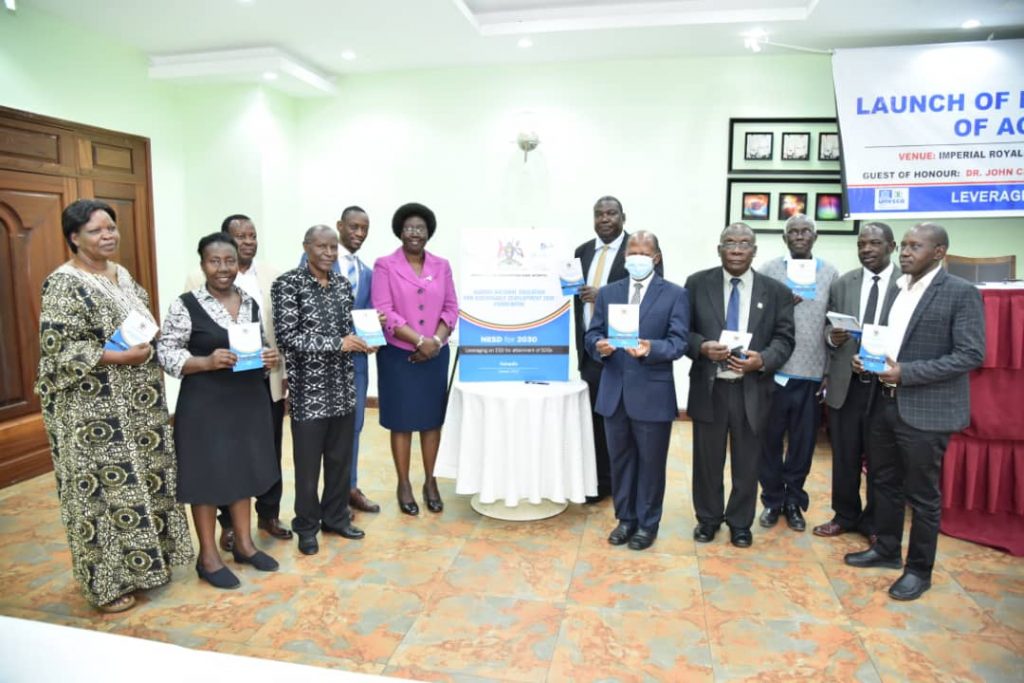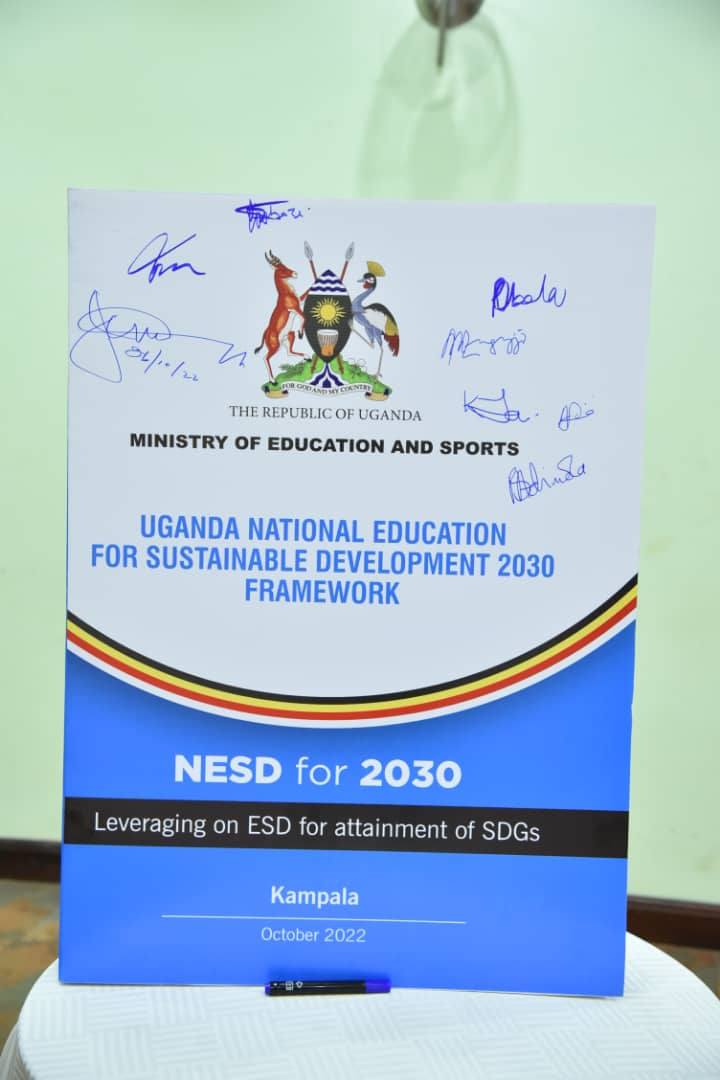The National Education for Sustainable Development (ESD) for 2030 Framework of Action for Uganda was launched under the theme “leveraging on ESD for attainment of SDG’s”. The event took place on the 26th/10/2022 at Imperial Royale Hotel in Kampala and was officiated by The Minister of State for higher Education Hon. Dr. J.C Muyingo.

Hon. J.C. Muyingo launching ESD framework of action for Uganda
The National Education for Sustainable Development Framework was developed as a response to the Global Framework for Education for Sustainable Development that aims to contribute towards achievement of the Sustainable Development Goals (SDGs). The document was developed collectively by a team of dedicated members and champions of Education for Sustainable Development, drawn from Ministries, Departments, Agencies, Academia, non-state actors as well as individuals in their respective rights and Uganda National Commission for UNESCO (UNATCOM) played a leading role in coordinating the process of developing the framework.

Team of champions that developed the framework posing for a group photo with the Minister of State after the launch
Ms. Rosie Agoi, Secretary General, UNATCOM in her opening remarks emphasized that Uganda`s National Education for Sustainable Development for 2030 framework (NESD for 2030) is meant to contribute to the achievement of the global and country sustainable development agenda. She further noted that it will provide country direction to the implementation and acceleration of ESD’s contribution towards the 17 SDGs.
It is important to note that the development of the country ESD framework coincides with the launch of the global ESD for 2030 framework. Uganda is among the first countries taking the lead in localizing the global ESD for 2030 framework and the Government of Uganda continues to support systems that provide leaners with skills needed to thrive in the new sustainable economy, working in areas such as renewable energy, smart agriculture, forest rehabilitation, the design of resource-efficient cities, and sound management of healthy ecosystems.
Prof. Eriabu Lugujjo appealed to all educators that the ESD agenda in Uganda need to emphasize participatory learning in schools, with emphasis on group or peer learning, developing dialogue, experiential learning, action research/learning to act, and developing case studies with local community groups and business, thinking creatively for future scenarios by using role play, real-world inquiry, futures visioning, problem-based learning, and providing space for emergence.
ESD is not only about environmental friendly actions, it also involves equipping young people with life skills that are extremely important for personal development and respect for diversity- Ms. Rosie Agoi
NESD for 2030 is thus both a mechanism for translating commitments into local aspirations but also concrete actions. The action plan specifies key interventions, actions, indicators and responsible actors among others. The framework follows the global ESD priority areas of advancing policy, transforming training and learning environment, building capacities of educators, mobilizing youth and accelerating sustainable solutions at local level.
The framework is also aligned to the new National Development Plan III 2020/21-2024/25 and four NDP III programmes have been identified as high impact accelerators. The NESD for 2030 priority areas have been fused with an additional four emerging areas of environment and climate change, refugees, digital education and emergencies and pandemics. This is an important element for relevancy and sustainability of the framework. The implementation of NESD for 2030 is premised on a multimodal and multi-stakeholder approach that brings on board both state and non-state actors. The setup of a NESD for 2030 network will bring on board all the ESD partners and further usher in a coordination structure that has long been lacking.
The ESD for 2030 framework of action we are launching today will help us guide Institutions of learning to nurture a new generation of environmentally aware socially stable and economically viable citizens to support the transition to a prosperous and sustainable future Hon. Dr. J.C Muyingo.
Hon. Dr. J. C Muyingo in his speech noted that as the country moves towards the last milestone towards achieving the 2030 SDGs, he had no doubt that NESD for 2030 presents a viable opportunity for the achievement of the goals and he therefore recommended and called upon all actors, ESD partners and stakeholders at all levels to embrace the framework and translate the action plan into results in order to leverage on ESD to achieve the 17 SDGs”
The launch was attended by various stakeholders from Government Ministries, Departments and Agencies, Civil Society Organizations, Academia, Media and Individuals interested in Education for Sustainable Development.
E-Copy of the NESD for 2030 Framework for Uganda cane be Accesses HERE

